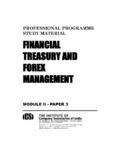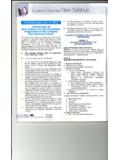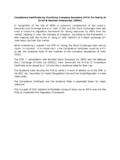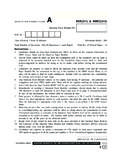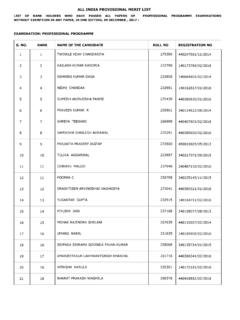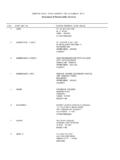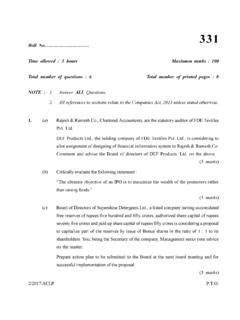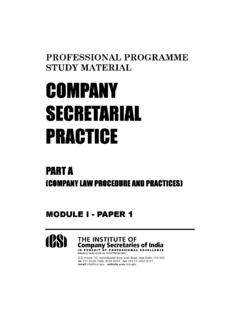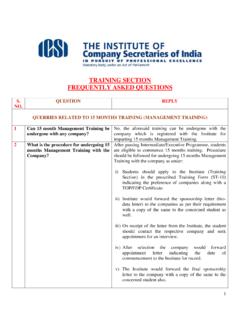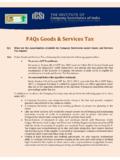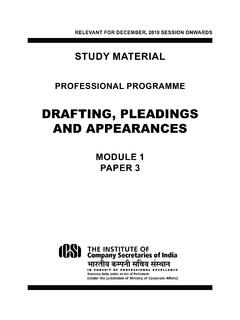Transcription of GUIDANCE NOTE ON GENERAL MEETINGS
1 GUIDANCE NOTEONGENERAL MEETINGS1 The secretarial Standard on GENERAL MEETINGS (SS-2), formulated by theSecretarial standards Board (SSB) of the Institute of Company Secretaries ofIndia (ICSI) and issued by the Council of the ICSI, has been approved by theCentral Government. Adherence to SS-2 is mandatory in terms of sub-section(10) of section 118 of the Companies Act, 2013 (the Act). SS-2 applies to all typesof GENERAL MEETINGS , in respect of which Notices are issued on or after 1st July, prescribes a set of principles for convening and conducting GeneralMeetings and matters related GUIDANCE Note sets out the explanations, procedures and practical aspectsin respect of the provisions contained in SS-2 to facilitate compliance thereof bythe Act mandates holding of MEETINGS at specified intervals and also prescribesrelated procedural rules for the same.
2 Such mandate is in recognition of thefact that MEETINGS play a vital role in the functioning and governance of acompany. The primary purpose of a meeting is to ensure that a company givesreasonable and fair opportunity to those entitled to participate in the meeting totake decisions as per the prescribed procedures. A company, being an artificialperson, can, in respect of matters to be decided at GENERAL meeting , take suchdecisions through its Members by way of Resolutions passed at validly heldMeetings. MEETINGS of Members are known as GENERAL MEETINGS anddetermining what constitutes such validly held meeting is of utmost MEETINGS can be broadly categorised as follows:(i) Annual GENERAL meeting -Every company is required to hold, during everyCalendar Year, a meeting of its Members called the Annual GENERAL importance of the Annual GENERAL meeting arises out of the nature ofbusiness transacted at this meeting .
3 Broadly there are two types of businessthat are transacted at an Annual GENERAL meeting Ordinary Business andSpecial Business. At an Annual GENERAL meeting , consideration of financialGUIDANCE NOTEON GENERAL MEETINGS2statements & consolidated financial statements and reports of the Board ofDirectors and the auditors, declaration of dividend, appointment of Directors inplace of those retiring and approval or ratification of appointment of the Auditorsand fixing their remuneration are Ordinary Business. Any other item of businessis referred to as Special Business and may also be transacted at an AnnualGeneral GENERAL MEETINGS provide Members with an opportunity to collectivelydiscuss the affairs of the company and to exercise their ultimate control overthe management of the company. If a company defaults in any year in holdingits Annual GENERAL meeting , any Member of the company has a statutory rightto approach the Company Law Board (CLB)/National Company Law Tribunal(Tribunal) to call or direct the company to call an Annual GENERAL meeting .
4 (ii) Extra-Ordinary GENERAL meeting A company may also hold any otherMeeting of its Members called an Extra-Ordinary GENERAL meeting , as andwhen required or at the requisition of the Members. An Extra-Ordinary GeneralMeeting is convened for transacting Special or Urgent business that may arisein between two Annual GENERAL MEETINGS . All business transacted at an Extra-Ordinary GENERAL meeting are called Special Business.(iii) meeting of a Class of Members- Such MEETINGS are held to pass Resolutionswhich only bind the Members of the concerned class. Only Members of thatclass can attend such MEETINGS and speak as well as vote thereat, Meetingsof holders of preference shares. Such MEETINGS are required to be convenedwhen it is proposed to vary the rights of the holders of a particular class ofshares. Provisions which govern GENERAL MEETINGS aremutatis mutandisapplicable to such MEETINGS .
5 (iv) MEETINGS of Debenture Holders, Creditors etc. - Such MEETINGS are held topass Resolutions which bind the debenture holders or creditors, as the casemay be, of the company. The debenture holders or creditors, as the case maybe, can attend such MEETINGS and speak as well as vote thereat. Provisionswhich govern GENERAL MEETINGS aremutatis mutandis applicable to suchMeetings.(v) Other MEETINGS -In addition to the abovementioned MEETINGS , a companymay also hold MEETINGS of its Members, debenture holders or creditors underthe directions of the Court or the CLB/Tribunal or any other of a company can exercise their powers and can bind the companywhen they act as a body at a validly convened and held meeting . They shouldact collectively and not individually. A Member or shareholder, irrespective ofhis shareholding, cannot bind a company by his individual NOTEON GENERAL MEETINGS3 INTRODUCTIONThe fundamental principles with respect to GENERAL MEETINGS are laid down inthe Act.
6 SS-2 facilitates compliance with these principles by endeavouring toprovide further clarity where there is ambiguity or establishing benchmarkstandards to harmonise prevalent diverse practices. Complying with SS-2ensures robust procedures and systems which protect the interests of thecompany and its stakeholders. Incidentally, it has been observed that thequantum and propensity for litigations or risk thereof is directly proportional tothe degree of non adherence of proper procedures and the non-availability ofproper records, especially in the case of small and private companies. Theobjective of SS-2 is to address such requires the Company Secretary(ies) to over-see the vital process offacilitating and recording the decision making process in a company besidesmaintaining the integrity of the MEETINGS .
7 Where there is no Company Secretaryin the company or in absence of the Company Secretary, any Director or otherKey Managerial Personnel (KMP) or any other person authorised by the Boardfor this purpose may discharge such of the functions of the Company Secretaryas given in does not seek to substitute or supplant any existing laws. It strives tosupplement such laws for promoting better corporate , in addition to SS-2, the requirements laid down under any otherapplicable laws, rules and regulations, need to be complied with. However, incase of variations in any provision of the applicable laws and SS-2, the stricterprovisions need to be complied OF SS-2In terms of sub-section (10) of Section 118 of the Act, every company is requiredto observe is thus applicable to the GENERAL MEETINGS of all companies incorporatedunder the Act including private and small companies, except One PersonCompanies (OPC) and such other class or classes of companies which areexempted by the Central Government through to companies governed under Special ActsSS-2 is also applicable to Banking Companies, Insurance Companies,Companies engaged in generation or supply of electricity, Companies governedby any Special Acts, if incorporated under the Act.
8 However, if the provisions ofthese Special Acts such as the Banking Regulation Act, 1949, the Insurance Act, GUIDANCE NOTEON GENERAL MEETINGS41938, etc. applicable to these companies are inconsistent with SS-2, then theprovisions of such Special Acts shall to the MEETINGS of class of Members, debenture holders andcreditorsThe principles enunciated in SS-2 for GENERAL MEETINGS of Members areapplicablemutatis mutandisto MEETINGS of class of Members, debentureholdersand meeting of Members or class of Members or debenture holders or creditorsof a company under the directions of the Court or the CLB / Tribunal or anyother prescribed authority shall be governed by SS-2 without prejudice to anyrules, regulations and directions prescribed for and orders of, such courts,judicial forums and other authorities with respect to the conduct of such of subsequent changes in the ActSS-2 is in conformity with the provisions of the Act.
9 However, if due to subsequentchanges in the Act, a particular Standard or any part thereof becomesinconsistent with the Act, the provisions of the Act shall prevail over the , if any stipulation contained in SS-2 is derived from anyprovision of law and if such provision is declared inapplicable to any class ofcompanies, such stipulation shall not apply to such class of Ministry of Corporate Affairs (MCA), Government of India, in exercise of itspowers conferred by clauses (a) and (b) of sub section (1) of Section 462 and inpursuance to sub-section (2) of the said section of the Act, vide NotificationsNo. 463(E), 464(E), 465(E) and 466(E) [(hereinafterreferred to as MCA Notification(s)] dated 5th June, 2015, directed that certainprovisions of the Act shall not apply or shall apply with such exceptions,modifications and adaptations as specified in the MCA Notification (s) toGovernment Companies, Private Companies, Nidhis and Companiesincorporated under Section 8 of the Companies Act, 2013 (corresponding toSection 25 of the Companies Act, 1956) , if due to the MCA Notification(s) referred to herein above orNotifications that may be issued in future, the provisions of the standards orany part thereof become inconsistent with any of the provisions of the Act, suchcorresponding provisions of the Act read with the MCA Notification (s) Notification No.)
10 466(E) dated 5th June, 2015 exempts Companiesincorporated under Section 8 of the Companies Act, 2013 (corresponding toSection 25 of the Companies Act, 1956) from the applicability of Section 118 ofGUIDANCE NOTEON GENERAL MEETINGS5the Act as a whole except that minutes of MEETINGS of such a company may berecorded within thirty days of the conclusion of every meeting in case ofcompanies where the Articles of Association provide for confirmation of minutesby circulation. Consequently, SS-2 is not applicable to companiesincorporatedunder Section 8 of the Companies Act, 2013. However, such companies mayvoluntarily comply with OF THE GUIDANCE NOTEThis GUIDANCE Note should be read in the context of elucidates, wherever necessary, the basis for setting a particular Standard,explains the procedural and practical aspects and gives illustrations.
